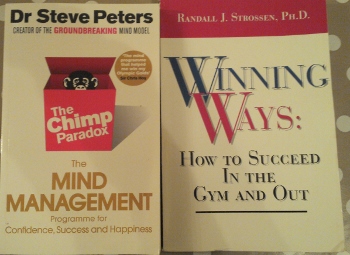Main Menu
Latest Blog Entry
User login
The best sport psychology book?
What is the best sport psychology book for coaches?
A discussion we had on the Level 3 Coaching Strength and Conditioning Sport Assessment on Saturday.
I always share some book ideas with coaches on the courses I deliver. This time the 3 I brought were:
- 6th Edition of Frank Dick’s “Sports Training Principles“.
- Phil Jackson’s “Eleven Rings“.
- Randall J. Strossen’s “Winning Ways: How to Succeed In the Gym and Out”.
 I said that Winning Ways and its predecessor “Stronger Minds, Stronger Bodies” were the best practical sport psychology books I had read.
I said that Winning Ways and its predecessor “Stronger Minds, Stronger Bodies” were the best practical sport psychology books I had read.
I liked “Chimp Paradox” by Steve Peters for overall life and underlyng understanding of the person.
However, Andy Ellis said that the Chimp Paradox had become a bit of a crutch for some athletes and he preferred “Mindset” by Carol Dweck.
Dweck talks about growth vs fixed mindsets and rewarding effort over achievement. It is a good read. However, this also has now become a mantra for some people to justify misinformation or disagreement with policy i.e “You have a fixed mindset“.
Because it is a good read, it is easy to forget to be critical this excellent critique of Mindset is worth reading as a counterpoint. The danger of coaches just reading pop psychology is that they lose their critical questioning skills.
This happened a few years ago with people quoting Bounce and Outliers as “facts” when these books are riddled with errors.
My other favourite sport psychology book is Jim Loehr’s Mental Toughness Training for Life”
Community of Practice
It was great to have this discussion on Saturday. We also talked about the use of External vs Internal Coaching Cues. This was a big part of the Level 3 course, with an excellent presentation by John Brierley on skill acquisition.
I mentioned this book:“Motor Learning in practice, a constraints led approach”: Renshaw, Davids & Savelsbergh (eds). A very useful book on coaching using task and environmental constraints. The introduction and boxing chapters are duffs: pretentious academic twaddle. The other chapters (particularly Renshaw) offer really useful insights and practical examples.
Andy Ellis then brought up that theories change over time, and that he would take evidence from an experienced coach, if what they did worked. This is the key point in coaching. We must challenge each other’s thinking and practices, as well as challenge those who come down from their Academic Ivory Towers and preach.
It is all too easy to get stuck within our own comfort zones, and safe environments and spend time in mutual grooming. I always appreciate the comments, ideas and challenges from Andy and all the other coaches who take part in our courses: it makes me think and question my practice. This then transfers to my athletes, which is most important.
Every coach who comes onto one of our courses is invited into our community of practice. If you want to develop your coaching skills as a strength and conditioning coach then it would be great to see you.
Read more: Best books for S&C coaches
Client Testimonials
 Jenny McGeever
Jenny McGeever
James has been my strength and conditioning coach since June 2009 and during this time he has provided me with constant support and helped me develop as an athlete, from Under 17 international level to senior international. He is currently helping me with my transition from fencer to Modern Pentathlete.
More

